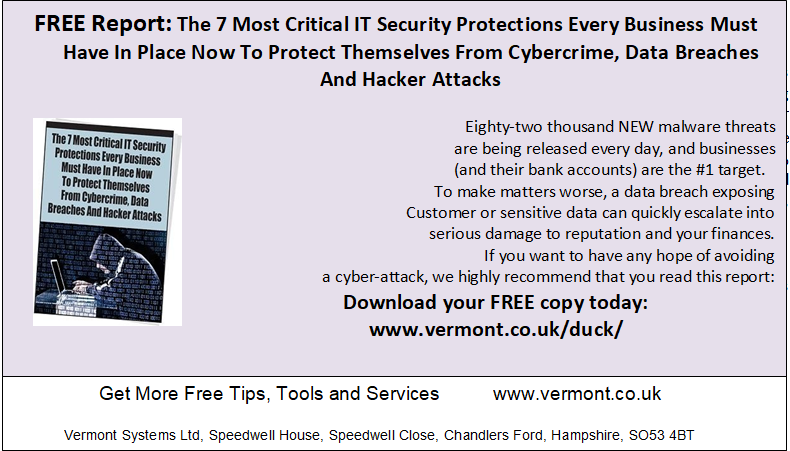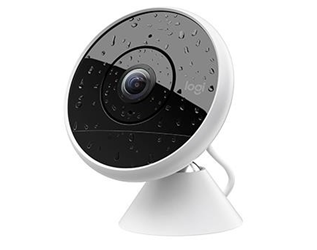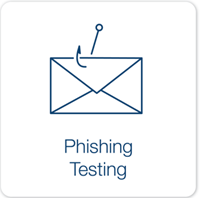The Shocking Truth Behind The Growing Cybercrime Threats You Face … And What You Can Do NOW To Protect Your Company

Are businesses losing the war on cybercrime? One recent article on ZDNet says yes. The number of security breaches has risen by 11% just in the last year. This is costing businesses even more in lost revenue dealing with these kinds of attacks. It’s wasting their time and resources.
In 2016, Cybersecurity Ventures stated that by 2021, digital crime will cost businesses a total of £6 trillion. So far, this projection seems on point as hackers continue to chip away at businesses around the world. They don’t care about the damage they’re doing.
Right now, the Internet is flooded with sensitive data. From passwords to financial information - it’s out there. Some of it is secure, some of it isn’t. Either way, because of the sheer amount of data floating out there, cybercriminals have a greater chance to get what they want. Over time, it becomes harder to protect that data.
But the cybersecurity industry has also grown in response. People are fighting back. In 2018, the investment into cybersecurity totaled £37 billion. However, it seems like it’s just not enough. When you look at small and medium-sized businesses – the targets of nearly 70% of cyber-attacks, according to SMB Group – cybersecurity isn’t taken as seriously as it should be.
In 2017, Harvard Business Review looked at the reasons behind why many businesses don’t take their cybersecurity seriously. The results were interesting. It turned out, businesses don’t treat cybersecurity as “the ongoing process that it is.” Instead, it’s typically treated as a “finite problem that can be solved.” In other words, if you do the bare minimum for security today, the thinking goes, you’ll be protected tomorrow. Surprisingly enough – that is not the case.
The problem is that as the Internet changes and evolves, so do the threats against its users. It’s pretty much impossible to set up a one-and-done security solution. If you were to set up something like an SME “quick fix” and walk away, there’s a good chance your business would be the successful target of an attack within a matter of months.
This kind of thinking is more costly than many business owners realise. A study by Akouto and Alpha Logistics found that businesses that underinvest in cybersecurity end up spending more on cybersecurity in the long run as they deal with attacks – up to 58% more! These costs don’t even include downtime, staff wages or lost revenue caused by data breaches. In short, recovering from an attack is FAR more expensive than investing in security now.
So, what can you do to protect your business? You can start with changing the way you think about cyber security. You have to accept that the threats are out there and will always be out there. But there are things you can do to minimise those threats.
Start with your staff. For many businesses, especially small and medium sized businesses and not for profit organisations, your biggest threat is right inside your organisation. For those of us who are Internet-savvy, most would never dream of clicking on a ‘dodgy’ link or responding to a phishing e-mail. We’ve been around the cyber block and we know what to look for…
However, people still fall for even the most basic scams. There will always be someone on your team who isn’t informed about these kinds of threats, who is caught at the wrong moment and is off guard or those who use obvious passwords. ZDNet points out that “only 26% of workers know what to do in the event of a breach” and that “7% openly acknowledge that they ignore or go around security policy.”
It pays to invest in a thorough and ongoing training program. It’s crucial to outline clear and firm security protocols so your team knows EXACTLY what to do. No one’s left guessing or clicking on anything they don’t recognize.
It’s also crucial to not go it alone. The single best way to stay on top of all things cyber security is to hire a highly experienced managed services provider who is up-to-date on the threats you’re facing. Having a partner means you don’t have to assume your business is protected. You’ll know your business is protected.
Please contact us to discuss in-house, bespoke training or any other security concerns that you may have. We are always very happy to help.

SHINY NEW GADGET OF THE MONTH:

Logitech’s Circle 2 Home Security Camera
The Internet age has made basic home security a straightforward affair, and with Logitech’s popular Circle 2 home security camera, it’s easier than ever to get in on the action. Equipped with 1080p livestreaming, a wide 180-degree viewing angle, free 24-hour event-based cloud storage and suitable for both indoor or outdoor use, it’s a powerful tool for keeping your home safe, whether you’re there or not.
The device works seamlessly with all the popular smart home platforms, and it is easy to set up. It offers crystal- clear video night or day and is easily viewable from your phone wherever you are. The built-in speaker and microphone enable you talk to your pet when the security camera is placed indoors or to the delivery driver when it's outdoors. In the market for a smart home security system, is the place to start?
RRP £199.99 – currently available on Amazon
Top Tips For Giving Better Speeches
Whenever you stand in front of a group, big or small, your influence and effectiveness are on the line. Whenever you speak publicly, no matter the occasion, it offers people a chance to form an opinion of you and your leadership abilities. Here are four tips to ensure your success when it comes time for you to present your ideas.
- Have confidence in yourself.
- Relax!
- Keep it short and simple.
- Don’t just say it – feel it!
Being a good public speaker doesn’t require magic or genius, but it does require a genuine desire to communicate well. Do you feel comfortable with the way you communicate with your friends, coworkers and family? If so, think of public speaking as an extension of the way you communicate every single day. The ease and confidence with which you talk every day is the same manner that you need to have when you are speaking in front of a room full of people. So, just remember: even if you’ve never given a speech, you’ve done this before!
Don’t get overwhelmed. Be comfortable with who you are. The more your personality comes through, the more authentic the audience will find you. Your job isn’t to impress the audience with what they think of you, but to influence them to think or do something because of your message.
There was a time when people would listen attentively to speeches that were literally hours long. Those times, as you know, have passed. Now that there are so many ways to get information - TV, radio, print media, the Internet - live speeches need to be short, simple and memorable. Take a look at the Gettysburg Address. It is about 270 words long. The address also uses simple, single-syllable words and short sentences. This simplicity will make your speech easier to digest and harder to forget.
Your audience will know if you don’t believe in or care about what you’re saying. If you don’t believe what you’re saying, why should your audience believe it? If what you’re saying isn’t important to you, then how can you expect your audience to care?
You can tell a story or be the story. When you tell, you communicate what happened. When you are the story, you reexperience what happened. Your feelings will enliven your words and your description will become more memorable.
The #1 Threat To Your Security Is ...
You! Well, you and your colleagues or employees. Like it or not, we are our own worst enemies online, inviting in hackers, viruses, data breaches and everything else under the digital sun through seemingly innocent actions. In most cases, this is done without malicious intent. However, if you aren’t monitoring what websites you, your colleagues or employees are visiting, what files they’re sending and receiving and even what they’re posting online and in company e-mails, you could be opening yourself up to a world of hurt.
That’s because employees’ actions can subject the company they work for to monetary loss, litigation, data theft and even criminal charges if they involve disclosure of confidential company information, transmission of pornography or exposure to malicious code.
There are two things you can do:
One, create an Acceptable Use Policy (AUP) to outline what employees can and cannot do with work devices, e-mail, data and Internet. This should include details for when not working in an office and if using their own devices. That way, they know how to play safe.
Second, implement ongoing training to keep security at the forefront of people’s minds. We can also run on- going phishing security tests and score your employees. This will show you if they know how to spot a suspicious e-mail and make them understand just how easy it is to be duped. With on-going testing to show what improvements are being made.

5 Underrated Habits Of Super-Successful People
- Asking Questions.
- Analyzing Feelings And Emotions.
- Standing Up To Their Inner Critics.
- Saying No.
- Leaving The Office.
Successful people are also the most curious. They’re more interested in finding answers than they are worried about appearing to not know everything.
The strongest people understand that they’re still human and learn to monitor,manage, and understand their inner workings.
It’s easy to beat yourself up and hard to practice self- compassion. But the latter will lead you to great things, while the former will stop progress in its place.
The best of us respect their own boundaries.
Do it – even working from home for 20% of the workweek has been shown to increase productivity, not to mention sanity. There are many other benefits related to working from home of course. These include:
It drives employee efficiency. Mainly due to fewer distractions.
It lowers stress and boosts morale. 80% of workers reported higher morale when working from home, while 69% reported lower absenteeism.
It often leads to greater employee engagement. Remote workers are often more engaged with colleagues and managers than in-office workers. The plethora of technological tools to help workers stay connected makes the difference.
It positively impacts the environment. Going green is a big incentive in the shift toward remote work.
Help Required Please
Can we ask you a small favour?
As you may be aware, at Vermont we are passionate about helping to educate local business leaders and have hosted many popular events in the past on subjects including GDPR Regulations and Cyber Crime Prevention.
We are currently planning our events for September and December 2019 and are hoping to host a ‘Directors’ Briefing’. Here at Vermont we would welcome your help in deciding what topics would be most important to you.
What would you like to see featured in our education programme?
Here are some suggestions but we would welcome your ideas - Disaster Recovery, moving to the cloud, Office 365, managing your time, introducing new values within the work place, cyber security…
Also, what time of day, location and day of the week would be most convenient for you to attend an event? We are always looking for new ideas and would really appreciate your help in planning for the next 6 months.
Please email: Kirsty.cartwright@vermont.co.uk - with your comments
Thank You!!!
Sign Up To Receive Our Monthly Newsletters

"At all stages Vermont has remained in close communication, tackling any problems cheerfully and efficiently"
Running an investment specialist IFA needs complex integration of numerous databases and systems...Richard Palmer, Senior Planner Murdoch Asset Management

"We've set ourselves ambitious plans for business expansion through 2019 and are confident that Vermont will provide their support and guidance to help us achieve them"
This is a long-term relationship offering long-term benefits all round.Sarah Kay, Office Manager Turbo Service International
